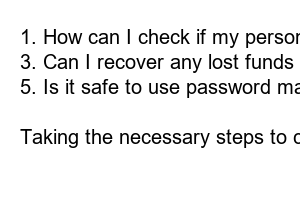개인 정보 유출 확인
Title: Confirm Personal Information Leakage – Protect Your Privacy Today!
Introduction:
In an era where data breaches and online scams are on the rise, protecting our personal information has become more crucial than ever. Confirming whether our personal information has leaked or been compromised is an essential step towards safeguarding our privacy and preventing identity theft. In this blog post, we will explore the significance of confirming personal information leakage and provide key insights on how to take proactive measures.
1. What is Personal Information Leakage?
Personal information leakage refers to the unauthorized disclosure of sensitive details, such as your name, address, social security number, financial information, or login credentials. This leakage can happen through various means, including data breaches, phishing attacks, or even unsecured websites.
2. How does Leakage Occur?
Leakage of personal information can occur when hackers exploit vulnerabilities in systems, networks, or applications. Additionally, unsuspecting individuals may unknowingly provide sensitive information to phishing emails that appear legitimate. Cybercriminals can also obtain personal data from publicly available sources or by hacking into online databases.
3. The Potential Consequences of Leakage:
The repercussions of personal information leakage can be severe, ranging from financial loss to reputation damage. Cybercriminals can misuse your data to commit identity theft, gain unauthorized access to your bank accounts, or even use your personal details for fraudulent activities. It is crucial to act promptly to minimize the risks associated with such leaks.
4. Confirming Personal Information Leakage:
Although it is challenging to completely prevent personal information leakage, early detection is key. Stay vigilant, and keep an eye out for any suspicious activities, such as unexpected financial transactions or unknown accounts being opened in your name. Regularly monitor your credit reports and bank statements for any discrepancies.
5. Taking Action to Safeguard Your Privacy:
If you suspect your personal information may have leaked, take immediate steps to mitigate the risks. Change your passwords for all online accounts, enable two-factor authentication whenever possible, and limit the information you share on social media platforms. Additionally, consider using reliable identity theft protection services that actively monitor your personal information and alert you to potential breaches.
6. Steps to Prevent Personal Information Leakage:
Prevention is always better than cure when it comes to personal information leakage. Strengthen your online security by using strong, unique passwords, keeping your devices up-to-date with the latest security patches, and avoiding suspicious websites or downloading files from unknown sources. Always verify the legitimacy of emails or messages before providing any personal details.
FAQs (Frequently Asked Questions):
1. How can I check if my personal information has been leaked?
2. What should I do if I find out my personal information has been compromised?
3. Can I recover any lost funds if my financial accounts are breached?
4. Are there any online tools available to help me detect personal information leakage?
5. Is it safe to use password managers to secure my login credentials?
6. What legal actions can I take if my personal information has been leaked?
Summary:
Taking the necessary steps to confirm personal information leakage is essential in maintaining your privacy and protecting yourself from identity theft. By staying vigilant, taking preventive measures, and promptly addressing any breaches, you can considerably minimize the risks associated with personal information leakage. Remember, your data security is in your hands, and every proactive step you take brings you closer to a safer and more secure online experience.

